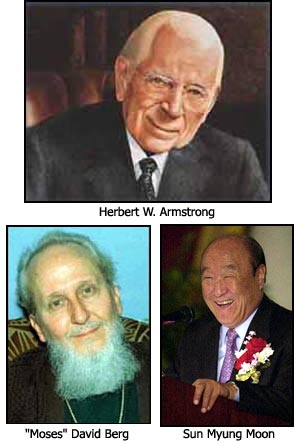The Danger of False Prophets
How to recognize a false prophet.

Ellen G. White, spiritual founder of the Seventh Day Adventist Church, spoke as a prophet of God in declaring that anyone who had not accepted the Adventist message by October 22, 1844 had no hope of eternal life. (Robert D. Brinsmead, Judged by the Gospel: A Review of Adventism, 1980, pp. 130-133.)
Charles Taze Russell, founder of the Jehovah’s Witnesses, prophesied that the end of the world would occur by the end of 1914. (Charles Taze Russell, The Time is at Hand, 1889, p.99.)
Florence Houteff, who succeeded her husband as head of the Branch Davidians, prophesied that David’s Kingdom would be established on earth on April 22, 1959. (The Watchman Expositor, “A History of False Prophets,” www.watchman.org, accessed on 9/11/2003.)
Herbert W. Armstrong, founder of the World Wide Church of God, prophesied that a great drought would strike the United States sometime before 1975, probably between 1965 and 1972, and that this would mark the beginning of the Great Tribulation which would result in the death of one-third of humanity. (Herbert W. Armstrong, 1975 in Prophecy, published in 1956, pp.10,12.)
“Moses” David Berg, leader of The Children of God, prophesied that the United States would be destroyed in 1974 by the comet Kohoutek. (David Berg, “The Third Letter of Moses on the Comet,” November 12, 1973.)
Jean Dixon, America’s most famous psychic, claiming that God spoke through her, predicted that a woman would be elected President of the United States during the decade of the 1980’s. (Ray Comfort, The Secrets of Nostradamus Exposed, Living Waters Publications, 1996, p.111.)
Edgar E. Whisenant, a Christian layman, predicted the Rapture of the Church would occur on September 12, 1988. His booklet, 88 Reasons Why Jesus Will Return in 1988, sold over four million copies. He confidently asserted, “Only if the Bible is in error am I wrong.” When the event failed to occur, he issued a new date of either September 1st or 30th, 1989. (The Watchman Expositor, “Failed Prophecy Hall of Fame,” www.watchman.org, accessed 9/22/2003, p. 2.)
Harold Camping, president of the Family Radio Network, set the date for the Lord’s return to be in the fall of 1994. His prediction was based on a complicated mathematical formula that tied the Rapture to the Jewish holiday of Sukkot. (Harold Camping, 1994?, published in 1992.)
The Bible on False Prophets
False prophets are all over the landscape today, and they are a sign of the times pointing to the soon return of Jesus.
Jesus Himself warned of false prophets in the end times. His most detailed discourse on end time signs is recorded in Matthew 24. In that passage the very first sign He mentions is false prophets (Matthew 24:4-5), and it is the only sign He repeats (Matthew 24:11,24). His warning was blunt and plain spoken: “Many false prophets will arise, and will mislead many.”
The Apostle Paul echoed the Lord’s warning when he spoke to the elders of the church in Ephesus. Here’s how he put it, as recorded in Acts 20:28-31 “Be on guard for yourselves and for all the flock… [for] I know that after my departure, savage wolves will come in among you, not sparing the flock; and from among your own selves men will arise, speaking perverse things to draw away the disciples after them. Therefore, be on the alert.”
Peter and John also warned against the danger of false prophets. Peter asserted that false prophets would “introduce destructive heresies, even denying the Master” (2 Peter 2:1). John exhorted his brethren to “test the spirits to see whether they are from God; because many false prophets have gone out into the world” (1 John 4:1).
John proceeded to provide a test that should be given to prophets. He said they are to be asked to confess that “Jesus Christ has come in the flesh” and that He is from God (1 John 4:2). He went on to assert that anyone who refuses to confess that Jesus is from God has the “spirit of antichrist” (1 John 4:3).
The Old Testament test of a prophet is spelled out in Deuteronomy 18:22 — “When a prophet speaks in the name of the Lord, if the thing does not come about or come true, that is the thing which the Lord has not spoken. The prophet has spoken it presumptuously…”
This, of course, is an obvious test. But what if the prophecy is fulfilled? Does that guarantee that the prophet is speaking for God? Not necessarily. The reason is that a prophetic utterance might be fulfilled by coincidence or because of supernatural insight given to the prophet by Satan. So there must be other tests.
Additional Tests
1) Does the prophet speak in the name of a god other than the true God revealed in Scripture?
If a prophet speaks in the name of Allah or Baal or Vishnu, you can be assured that he is a false prophet.
“If a prophet… rises among you and gives you a sign or wonder, and the sign or wonder comes true, concerning which he spoke to you, saying, ‘Let us go after other gods (whom you have not known), and let us serve them,’ you shall not listen to the words of the prophet…for the Lord your God is testing you.” (Deuteronomy 13:1-3)
2) Does the prophet’s message pass the test of Scripture?
If a prophet tells you that you can be saved by putting your faith in Mary, the mother of Jesus, you can be certain he is not a spokesman for God.
“But even though we, or an angel from heaven, should preach to you a gospel contrary to that which we have preached, let him be accursed.” (Galatians 1:8)
3) Does the prophet’s life manifest a commitment to holiness?
If a prophet lives a sinful life, his prophecies are to be doubted.
“Among the prophets of Jerusalem I have seen a horrible thing; the committing of adultery and walking in falsehood… Therefore, thus says the Lord of hosts concerning the prophets, ‘Behold, I am going to feed them wormwood and make them drink poisonous water.'” (Jeremiah 23:14-15)
4) Does the prophet’s teaching produce the fruit of the Spirit (Galatians 5:22-23)?
If the prophet’s followers are motivated to worldly living, the prophet does not speak for God.
“Beware of false prophets who come to you in sheep’s clothing, but inwardly are ravenous wolves. You will know them by their fruits… a good tree cannot produce bad fruit, nor can a bad tree produce good fruit.” (Matthew 7:15-16,18)
5) Does the prophet emphasize vain visions?
If the prophet focuses on personal visions with sensational insights (visits to Heaven or Hell, for example), his words are to be distrusted.
“Let no one keep defrauding you of your prize by… taking his stand on visions he has seen, inflated without cause by his fleshly mind.” (Colossians 2:18)
6) Does the prophet deliver only positive messages?
If the prophet never issues a call for repentance, he is to be suspect.
“Thus says the Lord of hosts, ‘Do not listen to the words of the prophets who are prophesying to you. They are leading you into futility; they speak a vision of their own imagination, not from the mouth of the Lord. They keep saying to those who despise Me, ‘The Lord has said, ‘You will have peace…” They say, ‘Calamity will not come upon you.'” (Jeremiah 23:16-17)
7) Does the prophet appear to be greedy for monetary gain?
If the prophet operates in a manner that makes it appear that his greatest interest is money, he is to be avoided.
“From the least even to the greatest, everyone is greedy for gain; from the prophet even to the priest, everyone practices deceit. And they heal the brokenness of the daughter of My people superficially, saying, “Peace, peace.” But there is no peace.” (Jeremiah 8:10-11)
8) Does the prophet focus on the exaltation of Jesus?
If a prophet tries to bring attention to himself or focuses on the Antichrist or the sensational, he is to be questioned.
“The testimony of Jesus is the spirit of prophecy.” (Revelation 19:10)
Over and over, the Word of God commands us to test all messages lest we be deceived and led astray. Paul urged the people of Berea to test everything he taught them, and they did so by “examining the Scriptures daily” to see whether what he was teaching was scriptural (Acts 17:10-11). Paul was an apostle! How much more so should we test everything we hear taught by the standard of the Word of God.
The tragedy is that most professing Christians today are incapable of testing anything because they are biblically ignorant. There is a famine of the Word in most churches today (Amos 8:11) as people are fed a diet of pop psychology and positive thinking.
What about you? Are you in the Word on a daily basis? Are you capable of testing doctrine by Scripture? If not, then you are a sitting duck for deception. “Examine everything carefully; hold fast to that which is good” (1 Thessalonians 5:21).




